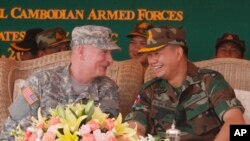The ruling Cambodian People’s Party has added at least 80 commanders and other security officials to its Central Committee, a move that even more closely ties security forces to the party.
The move sparked worry amid rights workers, who say military and police should be separated from top-level politics.
“Security force personnel can be ordinary party members, but as soon as they take a leadership role, they are crossing the line,” Brad Adams, Asia director for Human Rights Watch, said in a statement Wednesday. “Cambodia won’t have impartial, rights-respecting security forces so long as their commanders are beholden to the ruling party.”
CPP officials defended the move on Wednesday, saying the nominations were in accordance with the law.
The concerns come following a CPP congress over the weekend, in which the party increased its Central Committee from 262 to 568 members. Those included younger party members, including three sons of Prime Minister Hun Sen, the son of former police chief Hok Lundy, and the son of Interior Minister Sar Kheng.
CPP lawmaker Chheang Von said the party had decided to prepare the succession of leadership.
Ou Virak, president of the public policy group Future Forum, said the new members were simply family members of the old guard. “Sure they are young and better than the old, but there is still nepotism, like in the communist party in China,” he said.
The CPP shake-up was a response to the 2013 elections, where the party lost seats to the opposition, but it remains to be seen whether new policies will be more inclusive of traditional support bases for the opposition, such as labor.
Meanwhile, the promotion of security personnel into the Central Committee remains a concern, rights groups said.
Among them are Choun Sovann, chief of Phnom Penh police; Rath Sreang, commander of the gendarmerie of Phnom Penh; Par Socheatvong, governor of Phnom Penh; Huy Piseth, former commander of Hun Sen’s bodyguard unit; Hing Bunheang, the current commander of Hun Sen’s bodyguard unit; and Tea Vinh, commander of the Cambodian navy and brother of Defense Minister Tea Banh.
“Some of the commanders are well known for human rights abuses, and their promotion would affect the popularity of the ruling party,” said Ny Chakrya, head of the legal section at the rights group Adhoc. “And the violence will not be reduced.”
Ou Virak said the armed forces are the key to controlling power. “If they are under the party’s direction,” he said, “they can do whatever they want.”







